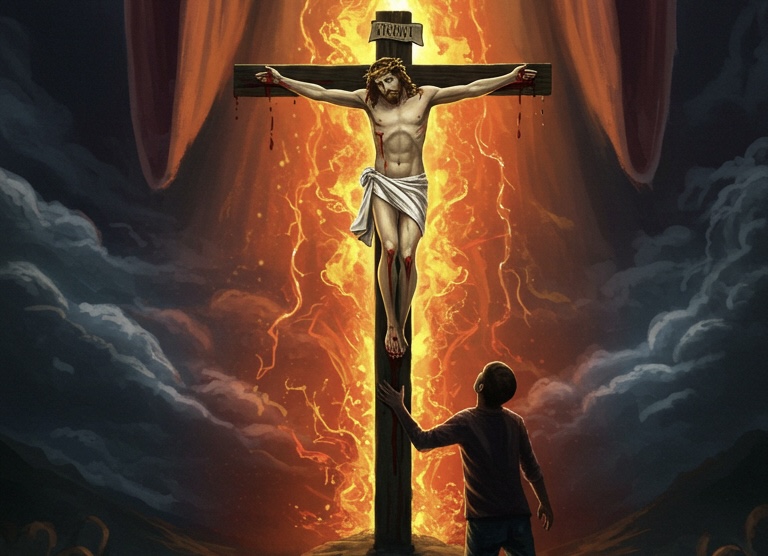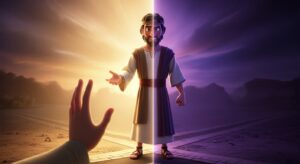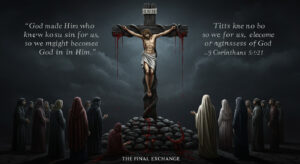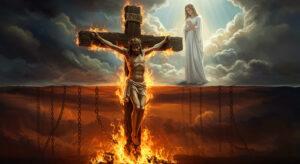## **Part 2: The Blood That Speaks — From the Shadow to the Fulfillment**
When Adam sinned, death entered the world (Romans 5:12). Not just physical death, but spiritual death — separation from God.
The moment sin came, **life was demanded**. Because sin always brings death, and death always demands blood — for *the life of a creature is in the blood* (Leviticus 17:11).
From the beginning, God showed this truth.
When Adam and Eve tried to cover their shame with fig leaves, God replaced it with **animal skins** (Genesis 3:21). That means blood had to be shed. It was a quiet prophecy — a whisper that *innocent blood must cover guilty flesh.*
### **Abel’s Sacrifice — The Blood that Spoke First**
The first clear picture of atonement appeared with Abel. Both Cain and Abel offered sacrifices. Cain brought fruits of the ground — the work of his hands. Abel brought the **firstborn of his flock** — blood.
God accepted Abel’s offering but rejected Cain’s (Genesis 4:4–5). Why? Because forgiveness never comes through human effort, but through shed blood. Cain’s sacrifice represented *self-righteousness*; Abel’s represented *faith in substitution*.
When Cain killed Abel, God said, *“The voice of your brother’s blood cries out from the ground.”* (Genesis 4:10)
That is the first time the Bible says **blood has a voice.**
Abel’s blood cried for *justice*.
But when Jesus’ blood was shed, it cried for *mercy* (Hebrews 12:24).
Abel’s blood said, “Punish the guilty.”
Jesus’ blood said, “Forgive them, for they know not what they do.”
From that day, God began teaching man one lesson over and over: *Without blood, there is no cleansing. But with blood, there is mercy.*
—
### **The Blood on the Door — The Passover Mystery**
Fast forward to Israel in Egypt. After centuries of slavery, God was ready to set them free. But before deliverance, there had to be judgment.
The angel of death would pass through Egypt that night — every firstborn would die. But God gave His people a way of escape:
> “Take a lamb without blemish, kill it, and put its blood on your doorposts. When I see the blood, I will pass over you.” (Exodus 12)
It wasn’t their behavior that saved them — not how moral or holy they were — it was **the blood on their door**. The angel didn’t enter to check who was sinless; he only looked for the blood.
That blood stood as a **sign**: death has already visited this house. A life has already been given.
This was not just a one-night event — it was prophecy in motion. The lamb represented Jesus, the perfect Lamb of God (John 1:29). The doorposts represented the heart.
And the message still speaks today: *When God sees the blood of Jesus on your life, judgment passes over you.*
Even if you stumble, even if your conscience feels weak, even if others accuse you — the blood speaks louder than your accusers. That’s why the Bible says Jesus’ blood “speaks better things than that of Abel.” (Hebrews 12:24)
—
### **The Tabernacle and the Mercy Seat — Shadows of Redemption**
After Israel left Egypt, God gave Moses instructions for a tabernacle — a place where He would dwell among His people. Every detail of that system pointed to Jesus.
There was an altar for sacrifices, a laver for washing, a holy place, and a Most Holy Place. Inside the Most Holy Place was the **Ark of the Covenant**, covered by a golden lid called the **Mercy Seat**.
Once every year, the high priest entered the Most Holy Place on the Day of Atonement (Leviticus 16). He could not go empty-handed — he had to carry **blood** from the sacrifice. He sprinkled that blood on the Mercy Seat seven times, representing perfection.
What was inside the Ark?
* The tablets of the Law (which Israel broke)
* Aaron’s rod (which represented God’s chosen priesthood)
* Manna (which represented God’s provision they had complained against)
In other words, **everything inside the Ark represented man’s failure.**
But above it was the Mercy Seat — and what covered it? **Blood.**
So when God looked down, He didn’t see the broken law or the rebellion — He saw the blood that covered it. That’s grace.
If there was no blood, the presence of God would consume the priest.
But when the blood was present, the same presence that could kill became the presence that forgave.
This is what happened on the cross: Jesus became our High Priest and our Sacrifice at once (Hebrews 9:11–12). He entered not an earthly temple, but the heavenly one, offering His own blood once and for all.
—
### **Why Blood? The Life Principle**
Some people ask, “Why did God choose blood?”
Because blood is life. When life is poured out, sin’s price — which is death — is paid.
In Leviticus 17:11, God said:
> “The life of the flesh is in the blood, and I have given it to you upon the altar to make atonement for your souls.”
Notice the words: *I have given it to you.*
The blood was a **gift**, not man’s invention. It was God’s way of saying, “I will accept life for life — but not yours. I will provide the substitute.”
That’s why from Adam to Abraham to Moses, every covenant was sealed by blood.
* With **Abraham**, animals were cut and God passed between the pieces — a covenant in blood (Genesis 15).
* With **Moses**, the people said, “We will obey,” and he sprinkled blood on them — the blood of the covenant (Exodus 24).
* With **Jesus**, He lifted the cup and said, “This is My blood of the new covenant, shed for the forgiveness of sins.” (Matthew 26:28)
Every old covenant was temporary; this one was eternal.
—
### **The Weight of One Sin**
To understand the cross, we must understand sin’s weight.
Even one sin separates a man from God — because God is perfectly holy.
Imagine a glass of pure water. If you drop just one grain of poison in it, it becomes deadly. It doesn’t matter if the rest is pure — one drop spoils it all. That’s how holiness works.
So, if we say, “I only lied once,” or “I only lusted in my heart,” that’s already enough to stand guilty before divine justice (James 2:10).
That’s why human goodness cannot save.
If salvation were based on behavior, then heaven would be empty — because everyone has fallen short of the glory of God (Romans 3:23).
Even those who “sin little” still need blood. That’s what Jesus meant when He spoke of the two debtors (Luke 7:41–43). Whether your sin is great or small, forgiveness comes only one way — by the blood.
—
### **The Shadow Meets the Substance**
All the animal sacrifices of the Old Testament were shadows — repeating symbols pointing to something greater.
When Jesus died, the shadow met the substance.
At that very moment, the veil of the temple tore from top to bottom (Matthew 27:51). The way to God was opened, not by law-keeping, not by human effort, but by blood — His own blood.
Before that, only the high priest could enter the Most Holy Place once a year. But now, *anyone* can come boldly to the throne of grace (Hebrews 4:16).
The blood of bulls and goats could never make the worshipper perfect. It could only remind them of sin. But the blood of Jesus removes sin forever (Hebrews 10:1–14).
When He said, *“It is finished,”* He didn’t mean, “My pain is over.”
He meant, “The work of redemption is complete.” The price is paid. The guilty can now go free.
—
### **The Blood Still Speaks**
Even now, in heaven, the blood of Jesus still speaks (Hebrews 12:24). It doesn’t dry up or lose power. It forever declares, “Paid in full!”
When Satan accuses you, the blood speaks louder.
When your conscience condemns you, the blood testifies that your sins are forgiven.
When you fall, the blood says, “He is still Mine.”
That’s why Revelation 12:11 says believers overcome by the blood of the Lamb and the word of their testimony. Not by perfection, not by works, but by the blood.
So when you fail and the devil whispers, “You’re not worthy,” your answer is simple:
> “I was never worthy — but the blood made me clean.”
—






